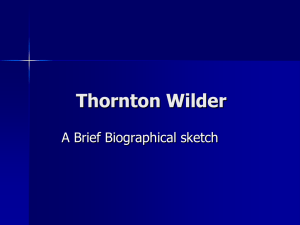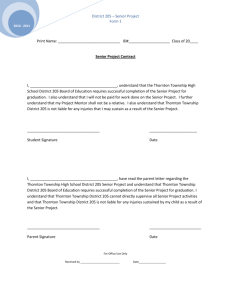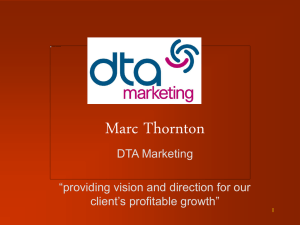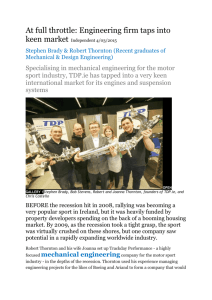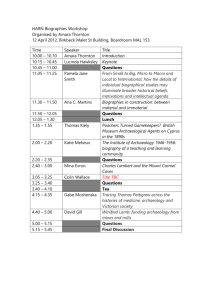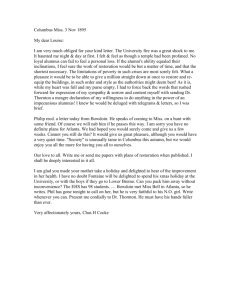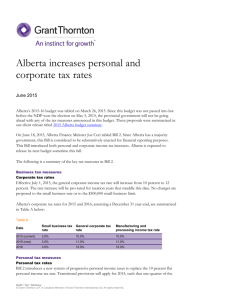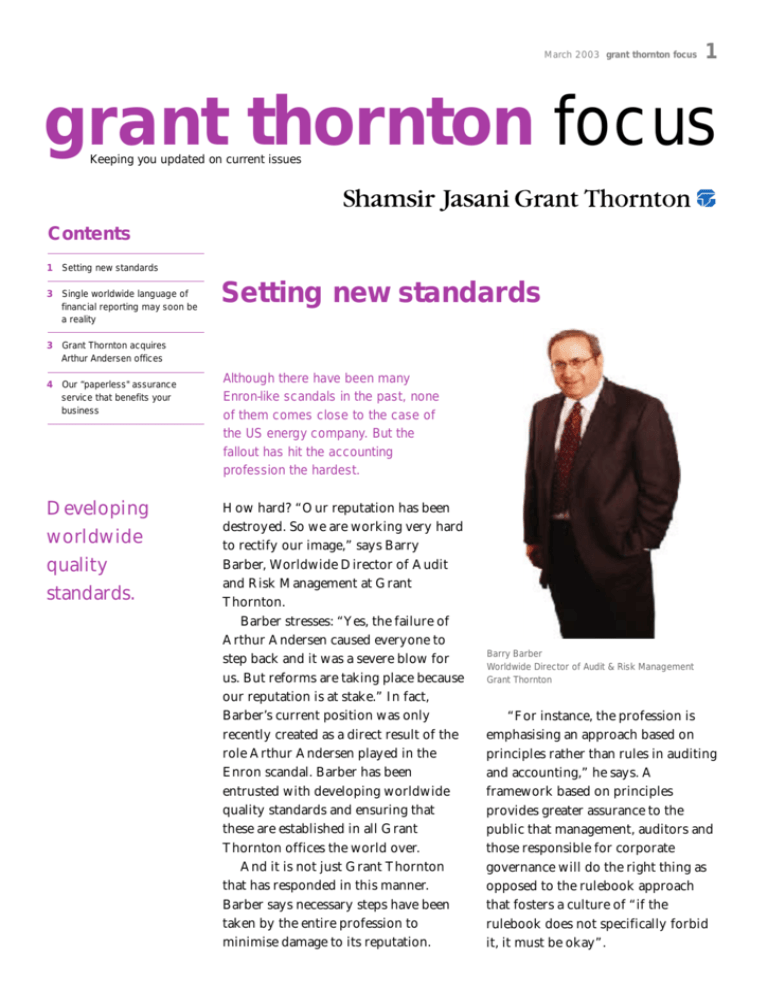
March 2003 grant thornton focus
1
grant thornton focus
Keeping you updated on current issues
Contents
1 Setting new standards
3 Single worldwide language of
financial reporting may soon be
a reality
Setting new standards
3 Grant Thornton acquires
Arthur Andersen offices
4 Our “paperless" assurance
service that benefits your
business
Developing
worldwide
quality
standards.
Although there have been many
Enron-like scandals in the past, none
of them comes close to the case of
the US energy company. But the
fallout has hit the accounting
profession the hardest.
How hard? “Our reputation has been
destroyed. So we are working very hard
to rectify our image,” says Barry
Barber, Worldwide Director of Audit
and Risk Management at Grant
Thornton.
Barber stresses: “Yes, the failure of
Arthur Andersen caused everyone to
step back and it was a severe blow for
us. But reforms are taking place because
our reputation is at stake.” In fact,
Barber’s current position was only
recently created as a direct result of the
role Arthur Andersen played in the
Enron scandal. Barber has been
entrusted with developing worldwide
quality standards and ensuring that
these are established in all Grant
Thornton offices the world over.
And it is not just Grant Thornton
that has responded in this manner.
Barber says necessary steps have been
taken by the entire profession to
minimise damage to its reputation.
Barry Barber
Worldwide Director of Audit & Risk Management
Grant Thornton
“For instance, the profession is
emphasising an approach based on
principles rather than rules in auditing
and accounting,” he says. A
framework based on principles
provides greater assurance to the
public that management, auditors and
those responsible for corporate
governance will do the right thing as
opposed to the rulebook approach
that fosters a culture of “if the
rulebook does not specifically forbid
it, it must be okay”.
2
March 2003 grant thornton focus
Even before the Enron scandal
erupted, the Kuala Lumpur Stock
Exchange had implemented
guidelines to ensure corporate
governance.
Another effort by the accounting fraternity to boost
public confidence is the development of a global standard
setting, work on which has been ongoing for the past two
years, says Barber. Expected to be in place next year or in
2004, the system will ensure that:
• the methodologies of audit policies are equivalent to
the International Standard on Auditing;
• Firms comply with the International Federation of
Accountants (IFAC) Code of Ethics;
• Relevant international training programmes are
maintained; and
• Appropriate quality control standards are
maintained.
This global initiative by the Forum of Firms (FOF) was
introduced because of the need for a consistent worldwide
accounting standard, Barber explains.
The FOF is an organisation of international firms that
perform audits of financial statements that are, or may be,
used across national borders. It is part of the IFAC, a body
of national professional accountancy organisations that
represent accountants employed in public practice, business
and industry, the public sector, education as well as some
specialised groups that interface frequently with the
profession.
The IFAC has 156 member bodies in 114 countries,
representing two million accountants.
Dato' N K Jasani, the Managing Partner of Grant
Thornton’s Malaysian member firm, Shamsir Jasani Grant
Thornton, says the accounting profession in Malaysia has
been on its toes with regard to protecting its image.
“In Malaysia, the Malaysian Institute of Accountants
(MIA) has a committee which is coming up with a structure
to have a quality-review standard for all accounting
practices at regular intervals,” he explains. This standard
will complement the international initiative that Barber
spoke about.
Even before the Enron scandal erupted, the Kuala
Lumpur Stock Exchange had implemented guidelines to
ensure corporate governance. Boards of Directors are
required to have at least two independent directors, and
companies to have an audit committee of at least three
members; two-thirds of the committee must also be
independent. “One of the independent members of the
audit committee must be a MIA member or have
qualifications recognised by the MIA,” Jasani says.
Yet another indicator of the severity of Enron’s impact
on the profession lies in the handling of new clients.
Grant Thornton now takes a harder look at clients.
“We sometimes also conduct background checks on the
officers and directors,” Barber explains.
Two years ago, the organisation developed client
procedures that include discussions with potential clients.
“For instance, we query why the previous accountant left
the company,” he says. This may sound good, but Arthur
Andersen also had such procedures. Barber agrees but
points out that Grant Thornton’s clients are mid-market
entrepreneurs. “For Arthur Andersen, Enron was one of
its biggest clients. Unfortunately, you will do everything
you can to please such a client. We are not dependent on
specific clients,” he says.
Many companies today hire accountants with one
mandate: “We want to pay as little taxes as we can get
away with.” For the accounting firms, this has meant
“creative accounting”. So where do firms draw the line?
“If the client’s sole concern is to save on taxes, then
that’s the sort of client we may not want,” Barber says.
Copyright © 2002, The Edge Communications Sdn Bhd. All rights reserved.
Reprinted with permission.
March 2003 grant thornton focus
Single worldwide language of
financial reporting may soon be a
reality
Grant Thornton
acquires Arthur
Andersen offices
It is important for you
as business owners or
company directors to
be aware that your
business may be
affected if you need to
raise finance elsewhere.
Global financiers are
likely to use the IFRS
as a benchmark.
GRANT THORNTON has further
In April 2001, the restructured
International Accounting and
Standards Board (IASB) was given a
strong mandate by the major
constituents of the world's capital
markets to develop a single set of high
quality accounting standards.
Grant Thornton and five other
major accounting organisations:
PricewaterhouseCoopers, Ernst &
Young, KPMG, Deloitte Touche
Tohmatsu and BDO International
supported IASB's efforts and have
conducted three annual surveys of
reporting practices worldwide to
measure progress towards
convergence of the standards. The
latest report, GAAP Convergence
2002, summarises the plans, efforts
and achievements of 59 countries
towards convergence with
International Financial Reporting
Standards (IFRS). It focuses on
plans for listed companies.
The report reveals that significant
progress is being made towards
achieving the vision of a single
worldwide language of financial
reporting, notably for listed
companies. Over 90% of the
countries surveyed plan to converge
with IFRS.
As the convergence process
moves on, financiers, investors and
other stakeholders will use the global
accounting language of IFRS to
assess performance and their own
options and decisions. As far as
unlisted companies are concerned, it
does not ultimately make sense to
have two separate sets of standards
in operation in a country. The
benefits of convergence should be
made available to all companies, and
the report encourages the IASB to
prioritise its projects on SMEs and
companies in emerging economies.
3
strengthened its middle market
expertise in the US and UK with the
acquisition of a number of former
Arthur Andersen offices and a
substantial number of professionals.
To date, Grant Thornton has
acquired former Andersen offices in
Charlotte, Columbia, Greensboro,
Raleigh, Milwaukee, Orlando,
Albuquerque and Tulsa, and additional
Andersen middle market partners and
professionals in New York, Chicago,
Boston, Houston, Cleveland,
Cincinnati, San Francisco and Tampa,
totaling 60 partners and 500
additional employees.
In the UK, Grant Thornton has also
acquired a team of six project finance
specialists to its Edinburgh and
Glasgow offices.
4
March 2003 grant thornton focus
Our "paperless" assurance
service that benefits your
business
In a climate of constant change, where business is
increasingly global and the use of IT increasingly
sophisticated, the success or failure of a company is
becoming dependent on its ability to manage resources
and information. Grant Thornton understands this and has
developed the Grant Thornton Horizon (GT Horizon) to help
business manage this challenge and maintain their
competitive advantage.
Horizon is an innovative audit service that employs
technically-advanced audit software. It helps us capture
information about your business and improves our
understanding of how it operates. This information is
invaluable to the resulting audit, increasing its focus and
insight. It significantly changes the way in which our firms
organise and perform audits. Horizon looks in more depth
at the commercial issues that flow from the audit and the
business risks that are of real importance to you.
Horizon uses a Windows-based framework and
methodology. A key element within Horizon is a software
product, Grant Thornton Explorer which is developed
exclusively to assist us in meeting the demands of your
business. Explorer enables our audit teams to operate
systems that move beyond the simple examination of
transactions in isolation of other key elements within your
operations. It also enables us to perform a "paperless"
audit where the planning, execution and review will be
documented electronically.
How GT Horizon benefits your business:
• ours is a partner-led service where experienced
specialists are involved in all stages of the process to
ensure that what we deliver corresponds to your
needs and expectations
• we will assess your internal financial controls to
result in better planning for the future of your
business
• our focus is on understanding the important
transaction cycles affecting your business
• we employ the most advanced auditing techniques to
assist in analysing the components of your financial
statements.
For enquiries on our assurance service, please contact your
local Grant Thornton office.
We welcome you to share your opinions and suggestions with us.
Feedback may be directed to:
Corporate Communications Department
Shamsir Jasani Grant Thornton
Level 11-1, Faber Imperial Court
Jalan Sultan Ismail, P.O. Box 12337
50774 Kuala Lumpur
T (603) 2692 4022
F (603) 2691 5229
E venica@gt.com.my
Editorial & Design: Venica Soo
Grant Thornton Focus is published as a service to our clients, associates and other
interested parties. Please be advised that the information contained herein is for general
guidance only. Any reader intending to base a decision on information contained in this
publication is advised to consult us before proceeding.
© 2003 Shamsir Jasani Grant Thornton
Malaysian member of Grant Thornton International
www.gt.com.my
KUALA LUMPUR
KUANTAN
Ms Janise Lee
Mr Hooi Kok Mun
Level 11-1, Faber Imperial Court
Jalan Sultan Ismail
P.O. Box 12337
50774 Kuala Lumpur
T (603) 2692 4022
F (603) 2691 5229
E sjgt@gt.com.my
Mr Lui Kok Tham
A-105A, 1st Floor
Sri Dagangan
Jalan Tun Ismail
25000 Kuantan, Pahang
T (609) 515 6124
F (609) 515 6126
E info@sjgt-ktn.com.my
PENANG
JOHOR BAHRU
Mr Ooi Ark Heng
58-A, Jalan Cantonment
10250 Penang
T (604) 226 1852
F (604) 226 1873
E info@sjgt-pg.com.my
Mr Tommy Leong
Unit 29-04B, Level 29
Mailbox 227, Menara Landmark
12 Jalan Ngee Heng
80000 Johor Bahru, Johor
T (607) 223 1848
F (607) 224 9848
E info@sjgt-jb.com.my

